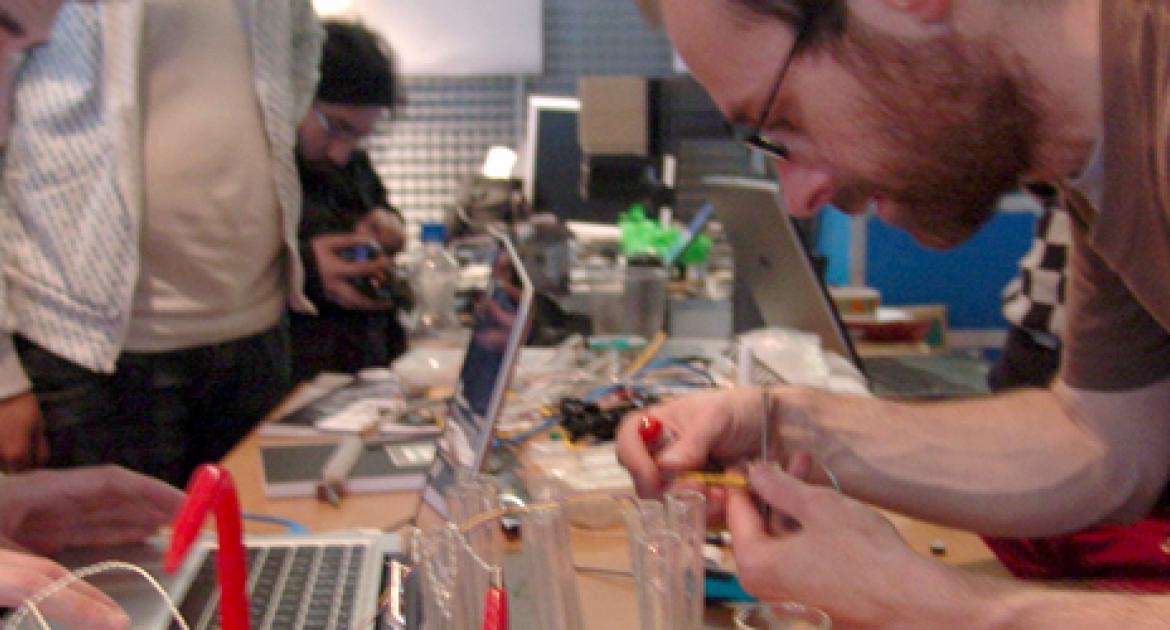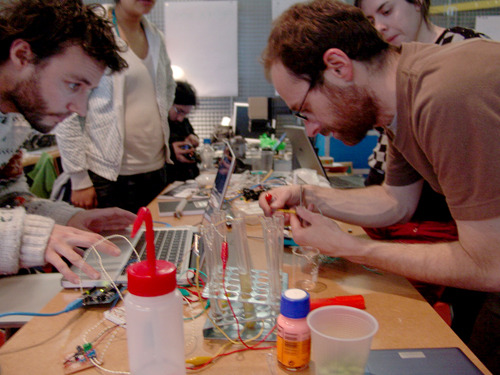Open Call · Interactivos?'10: Neighborhood Science

> From Garage to Neighbourhood Science
> Call for Projects
> Call for Papers
> LabtoLab Encounter (June 7 - 11)
> Collaboration between Interactivos?'10 and 2010 01SJ Biennial
> With the support of the Colombian Embassy in Madrid
> Tutors' Approach

Image: laimagendelmundo
From Garage to Neighbourhood Science
Inventions and discoveries such as the lightbulb, radioactivity, antibiotics, the synthesiser and the personal computer came out of homebased laboratories, most of the times without any backup from large institutions. Although we tend to associate their inventors with an image of absentminded, eccentric geniuses, in fact, their modernday counterparts are a multitude of people networking over the web. Entire communities have sprung up for distributed experiments and production of knowledge, exchanging ideas and information amongst amateurs, professionals and academics in all kinds of disciplines.
The proliferation of such “collaboratories” has led to the creation of enormous collective projects such as BOINC, Wikipedia and GNU/Linux. But it has also highlighted the need to tackle global problems whilst taking into account specific local characteristics.
The gates have been opened for "citizen science", in which neighbours can organise not just the management and development of knowledge, but also its application in decision making and redesigning the public agenda. They can open wideranging debates on the townplanning, environmental, cultural, education or technology policies developed by governments and have a significant impact on how local politics work or the living conditions in the local neighbourhood.
Last January, a workshop was held in Madrid, called Garage Science. Neighborhood Science will dig further into the subject, expanding the scope of the projects and involving a broader population. The proposal is to set up small urban experimental laboratories to channel and foster neighborhood participation based on experience, on the passion for learning and sharing that is characteristic of amateur and hacker culture, and on the possibility of taking control over the resolution of problems that affect and link together worldwide "communities of concern". We'd like to start moving citizen science out of the garage/prototype stage and onto the street, finding ways to move beyond the typical activist and hacker communities and into the lives of everyday friends, families, and neighbors.
Call for Projects
A maximum of ten projects will be selected to be collaboratively developed during a two-weeks production workshop (June 7 - 23, 2010).
Go to guidelines and submission form here
Call for Papers
A maximum of 5 papers will be selected among theoretical and research papers, presentations and analysis of the experiences about the proposed subject matter. Chosen papers will be presented in public during LabtoLab Encounter, celebrated coinciding with the workshop June 7-11, 2010.
Go to guidelines and submission form here
LabtoLab Encounter (June 7 - 11)
The Medialab International Encounter “LabtoLab” will take place at Medialab-Prado coinciding with the “Neighborhood Science” workshop.
Aiming to share experiences, study specific cases and explore Medialab's role in the production, exchange of knowledge and collaborative learning, other initiatives will be added to the European platform composed by Kitchen (Budapest), Constant (Brussels), Crealab (Nantes), A10lab (London) and Medialab-Prado (Madrid).
Collaboration between Interactivos?'10 and 2010 01SJ Biennial
A collaboration between Medialab-Prado and 2010 01SJ Biennial has been established for the programme Out of the Garage, September 4-19. After Madrid's workshop ends, one of the projects will be featured at the Festival, where it will continue to be developed in a 10 day collaborative production workshop.
More information soon.
With the support of the Colombian Embassy in Madrid
With the support of the Colombian Embassy in Madrid, Andrés Burbano, Alejandro Araque, Alejandro Duque and Alejandro Tamayo have been invited to participate in the group exhibition Estárter in the Off Limits space, teach the workshop “Interactivos?’10: Neighbourhood Science” and take part in the Medialab International Encounter “LabtoLab", taking place at Medialab-Prado.
These activities are part of Estárter project, which aims to encourage exchanges and the creation of knowledge, build relationships and produce works among transmedia creators from Colombia and Spain. It also aims to involve the institutions from both countries in a common project. Estárter attempts to stimulate creation by connecting different knowledge communities within a hybrid geography supporting the development of new networks that take advantage of the possibilities offered by information and communication technologies. On the spot encounters add an impulse to the common work of Spanish artists working in Colombia and vice versa.
Estárter is a Project by La Plataforma, coordinated by Aniara Rodado.
Tutors' Approach
"What makes us feel part of a neighbourhood, defending it or forgetting it? Belonging to a specific social and economic class, a collective nostalgia for a country left behind, to have grown up in that place or simply to be living there and wanting to enjoy it as much as possible?
What makes one neighbourhood different from another? Why are there neighbourhoods with charisma and others of which one cannot even remember their names? Is it the local customs, the architecture, the landscape, the bar with the best sandwiches in town or the stories of the area what makes the difference? Can an identity of a neighbourhood be created by living in different cities?
Could the processes of socialization, participation and consumption in a neighbourhood be changed? This could be done either through social networks and P2P systems or by using a similar functioning system from these technologies and translating them into the context and non-technical customs of local communities. Can a neighbourhood be invented?
Some starting points for inventing and rethinking a neighbourhood could be making collective decisions, public alerts, homey cuisine shared menus, a local P2P multimedia library; maintenance of urban gardens, home security, a digital billboard, a tour with recommended places to visit; resource recycling, energy and car sharing, exchange of services, creative coins and networks for exchanging aid among neighbours." By Platoniq
"We can do a kind of personal, everyday science by thinking of our actions as questions and the results of our actions as answers from the world. One of my favorite photos is of an elderly man standing deep in the muck of a local pond, holding up a jar of slimy water and grinning from ear to ear. I don't know what he was going to do with that water, exactly. Maybe count the number of tadpoles, or test for toxins, or just use it to start an aquarium in his own livingroom. Whatever the goal, what's clear is that he is full of the joy that comes from digging deep into the muck of the world and the excitement of exploring what you've brought up.
Neighborhood science starts when we share those everyday experiences and experiments, finding ways to compare notes, collaborate and coordinate resources. Things really get going when we begin to ask questions together, when our shared experiences lead to new kinds of actions and ideas. What does your dirty pond water have to do with my wearable wifi detector? How could a homemade remote control airplane connect to questions about traffic patterns, or the ecosystem of a local park? Why would a local store owner want to be involved in a window gardening project?
One real challenge in moving from personal, intimate projects to more inclusive neighborhood level engagement is the fact that neighborhoods are, hopefully, diverse. Your personal goals, politics, aesthetics are unlikely to precisely match those of your neighbors, peers from other parts of town, creative members of other generations, or even your own extended family. Yet moving beyond our own comfortable circles is essential if "garage science" is ever really going to leave the garage and become an essential part of our broader culture." By Douglas Repetto
"Science can also be like a little girl that learns every day how to speak, read and to ride a bicycle. She wakes up full of new questions answered through many levels of reality, not only in laboratories and observatories but also in the streets, garages and on the corners. This girl runs through streets and neighbourhoods full of curiosity.
This is the reason why even established scientists speak about Micro Science, People Science, Citizen Science and Intimate Science. This explains why, in a certain way, science also operates in day-to-day experiences at home in one’s room or in the neighbourhood." By Andrés Burbano
"After participating in a process of community actions with the kids in the neighbourhood and exhausted after days of filming, the group was together sitting in a corner and commented the need to create low cost filming home groups. On that day we came up with the idea of recycling cables, speakers and PCs to implement recording sound studios that can benefit the other kids in the neighbourhood. Memoirs from Susurros Project. Ex Situ / In Situ Prácticas Artísticas en Comunidad- Moravia-Medellín. Colombia.
I feel that it is important to create, in conjunction with the communities, processes of media appropriation, where anyone interested can feel that the pedagogic, experimental and the investigative fall into the local dynamics, strengthening political, social and collaborative discourses. These initiatives allow us to recognize and visualize local creations that are thought within their territory, culture and people." By Alejandro Araque
"Neighbourhood Science does not aim scientific positivism, on the contrary, we believe in the knowledge of the senior and in disorder; both compose a space in which one can experiment with soul and passion almost like in a ritual, a place where technology is not alienated and where tags such as “low tech”, “new tech” or “high tech” appear as vicious commercial interests of the industrial and commercial sector. This alienation can be stopped in simple methods such as a short circuit, the sound of signals, the opening of boxes, forgetting instruction manuals and rewriting codes." By Alejandro Duque
"When thinking about 'neighborhood science' the ideas of cybernetician Stafford Beer come to mind. Being in favor of offering the tools of science to the people, Beer proposed in the seventies the creation of a device that would allow citizens to express freely their level of comfort, or discomfort, with the government, showing the sum of opinions in a gigantic public screen. He called this future device an 'algedonic meter'.
Nowadays, his ideas echo with strong force as citizens are empowered with sophisticated technologies that in the past were only reserved to exclusive laboratories. For example, a mobile phone or a personal computer could be, in principle, transformed into a personal 'algedonic meter', and perhaps with not so much effort.
It is my opinion that Neighborhood Science is a great opportunity for re-examining the potential of our everyday technologies and to explore new uses for them. And also for imagining new and future tools and devices that may help us work better and easier in a collaborative way, share ideas, dreams and desires, or simply, to express freely our points of view." By Alejandro Tamayo



 Medialab-Matadero Madrid
Medialab-Matadero Madrid